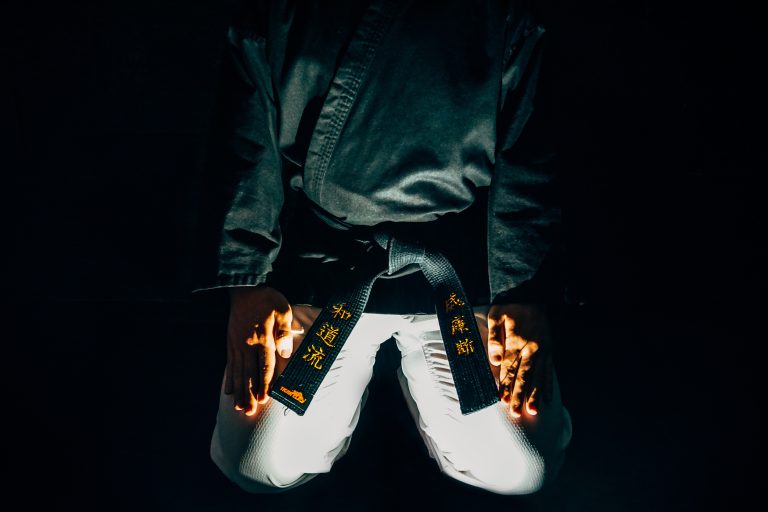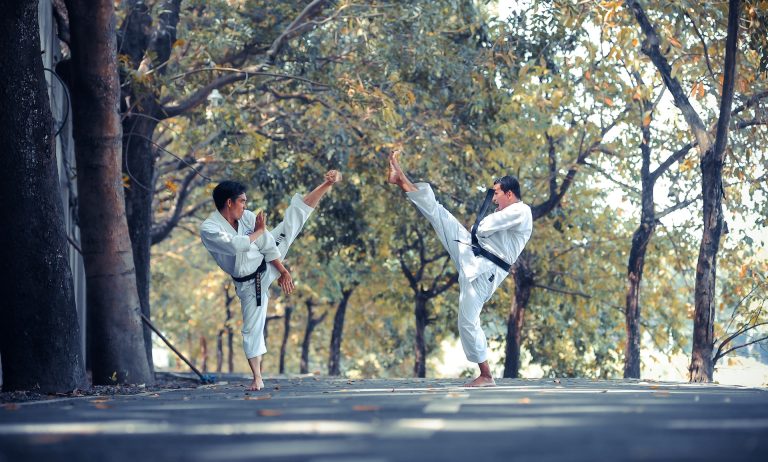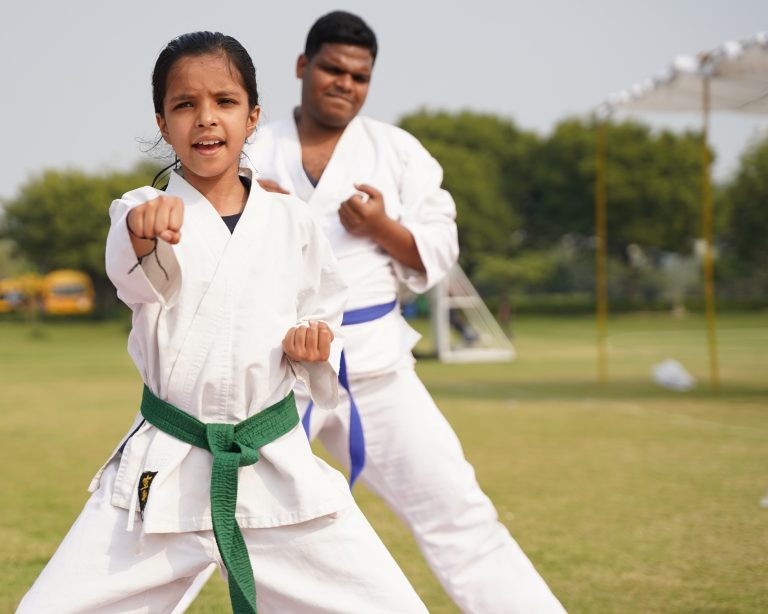Karate – Hindi Word Meaning in English
Karate is a term that is commonly used in the field of martial arts. Many people are curious about its origins and the meaning behind the term. In this blog post, we will explore the Hindi word ‚Karate‘ and its meaning in English.
Etymology of Karate
The word Karate is derived from the Japanese language. However, the roots of Karate can be traced back to China. The term originated from two Chinese characters: ‚kara‘ meaning empty, and ‚te‘ meaning hand, which combined to form the term ‚karate,‘ meaning „empty hand“.
The Okinawan masters of karate translated the characters of „empty hand“ to the closest-sounding Japanese pronunciation, which is „karate.“ Thus, karate became the term used to describe a martial art that focused on striking, kicking, and hand techniques without the use of weapons.
Meaning of Karate in English
The English meaning of Karate is „empty hand,“ as mentioned earlier. It refers to a martial art style developed and designed for self-defense or combat, relying on striking and grappling techniques using the hands and feet.
Karate emphasizes the use of the whole body to generate powerful striking force, speed, balance, and stamina. Regular practice builds discipline, mental focus, and physical strength.
As a martial art, Karate has become popular worldwide, and it is practiced by people of all ages and abilities. It is also an Olympic sport and a competitive art form.
The Basics of Karate
Karate is an art that requires discipline, dedication, and patience to master. The basic techniques of Karate consist of punches, kicks, blocks, and strikes.
The power of Karate techniques comes from using the entire body as a single unit to deliver a blow. The movements in Karate are crisp, fast, and efficient. Each technique is designed to deliver maximum striking force while using the least amount of energy.
One of the critical principles of Karate is the concept of „Kime.“ Kime refers to the state of holding power at the end of a strike or block. It must be a sharp and explosive motion that generates significant impact on an object or a target.
In Karate, students also focus on Kata, which is a structured set of movements practiced in a specific sequence. This practice helps to develop muscle memory, coordination, and timing.
Benefits of Practicing Karate
Practicing Karate has numerous benefits, not just for self-defense but also for physical and mental health.
Here are a few benefits of practicing Karate:
Physical Health Benefits:
– Improves cardiovascular health and fitness
– Builds strength, flexibility, and endurance
– Enhances reflexes and coordination
– Helps to maintain a healthy weight and body composition
– Strengthens bones and muscles
Mental Health Benefits:
– Promotes self-discipline and self-control
– Boosts self-confidence and self-esteem
– Develops mental focus and clarity
– Reduces stress and anxiety
– Fosters resilience and perseverance
Frequently Asked Questions About Karate Hindi Word Meaning in English
Karate, a Japanese martial art, has been practiced around the world with millions of people learning the art every year. In India, many people search for the Hindi meaning of karate in English to get a better understanding of this martial art. To help you with your query, we have put together a list of frequently asked questions about karate Hindi word meaning in English.
1. What does ‚karate‘ mean in English?
In English, ‚karate‘ means ‚empty hand.‘ The term originated from two Japanese words – ‚kara‘ meaning ‚empty‘ and ‚te‘ meaning hand. It signifies that karate practitioners use their unarmed body parts as weapons, without the need for any external tool or weapon.
2. Is Karate an Indian martial art?
No, Karate is not an Indian martial art. It originated in Okinawa, Japan, in the early 20th century. Karate was developed from indigenous fighting methods called te and Chinese martial arts practices introduced to Okinawa. Karate was introduced to India in the 1950s, and since then, it has grown in popularity across the country.
3. What are the different forms of karate?
There are several different forms of karate, each with its distinct style and techniques. Some of the popular forms of karate include Shotokan, Shorin-ryu, Goju-ryu, Wado-ryu, and Kyokushin. Each style of karate has its unique focus on techniques, including strikes, kicks, blocks, and throws.
4. What are the benefits of learning karate?
Karate offers several physical and mental health benefits. Some of the benefits of learning karate include improved fitness levels, increased strength, flexibility, and balance, better self-defense skills, enhanced discipline and focus, and reduced stress levels.
5. Can karate be learned by people of all ages?
Yes, karate can be learned by people of all ages. Children, adults, and seniors can all learn and practice karate. However, it is essential to choose the right form of karate that suits an individual’s age and fitness level. Some forms of karate may be more suitable for a particular age group than others.
6. What is the significance of belts in karate?
Belts are an essential component of karate training. They signify a practitioner’s level of skill and training in karate. In karate, the belt system follows a color hierarchy, with white belt being the starting level and black belt being the highest level. As a practitioner advances in their training, they progress through the belt levels, signifying their continued improvement and mastery of the art.
7. How long does it take to become a black belt in karate?
The time it takes to become a black belt in karate varies depending on individual skill level, dedication, and training frequency. Typically, it takes several years of consistent training and practice to reach the black belt level. On average, it takes around three to five years for a practitioner to attain a black belt.
8. Can karate be learned online?
While online learning options are available, it is not recommended to learn karate online. Karate is a martial art that requires physical training under the guidance of a qualified instructor. Learning karate from videos or online tutorials may lead to improper technique and increase the risk of injury. It is essential to learn karate in a structured training environment under a certified trainer.
Final Thoughts
Karate is a popular martial art form practiced across the globe. Understanding the Hindi word meaning of karate in English can help people get a better understanding of this martial art. We hope this article has answered your questions and helped you gain a better understanding of karate. If you are interested in learning karate, we recommend finding a qualified instructor and joining a reputable training institute.
Karate Hindi Word Meaning in English: A Comprehensive Guide
If you are a Martial Arts enthusiast, you might have come across the term Karate. Karate is a popular form of Martial Arts that originated in Japan. However, the word Karate has roots in the Hindi language as well. In Hindi, the word Karate means „empty hand“ or „free hand.“ In this guide, we will explore everything you need to know about the meaning of the word Karate in Hindi and how it relates to the English language.
Step 1: Understanding the Origins of Karate
Before we delve into the meaning of Karate in Hindi, let’s take a look at the origins of Karate. Karate is a Japanese Martial Art that developed in Okinawa, Japan, during the Ryukyu Kingdom period. Karate combines various techniques such as punching, kicking, knee strikes, and open-hand techniques. It is both an offensive and defensive Martial Art, which makes it a popular choice for self-defense.
Step 2: The Hindi Meaning of Karate
As mentioned earlier, the word Karate has roots in the Hindi language. In Hindi, the word Karate is derived from the Sanskrit word „Kara,“ which means hand or arm. The word Karate itself is a combination of two Japanese words: „Kara,“ meaning empty, and „Te,“ meaning hand. Together, they form the word Karate, meaning „empty hand“ or „free hand.“
Step 3: The English Meaning of Karate
Now that we have understood the Hindi meaning of Karate let’s take a look at the English meaning of the word. In English, Karate means a Japanese Martial Art that combines various techniques such as punching, kicking, and knee strikes. Karate is also known for its disciplined training methods, which include meditation and mental focus.
Step 4: How Karate has Influenced Popular Culture
Karate is one of the most popular forms of Martial Arts in the world. Its influence can be seen in various aspects of popular culture, including movies, TV shows, and books. One of the most popular examples of Karate’s influence in popular culture is the Karate Kid series, which revolves around the story of a young boy learning Karate from his mentor.
Step 5: Learning Karate Yourself
If you are interested in learning Karate yourself, there are various resources available online and offline. You can find numerous YouTube tutorials on Karate, or you can enroll in a Karate school near you. Karate is a challenging but rewarding Martial Art, and with enough practice, anyone can master its various techniques.
Conclusion
In conclusion, Karate is a Japanese Martial Art that has roots in the Hindi language. The Hindi meaning of Karate is „empty hand“ or „free hand,“ while the English meaning refers to a discipline that combines various techniques for self-defense. Karate has influenced popular culture in various ways and is an excellent choice for anyone who wants to learn a Martial Art. We hope this guide has helped you understand the meaning of Karate in Hindi and English.
Inhaltsverzeichnis






